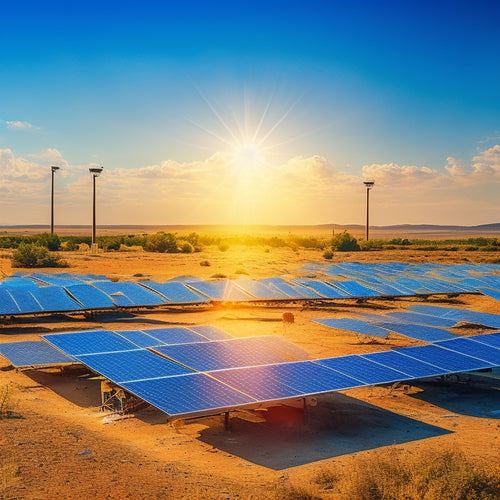
Achieve Home Power Freedom Off the Grid
Share
To achieve home power freedom off the grid, you'll need to accurately assess your energy needs, tracking daily usage, appliance types, and power ratings to identify inefficiencies and opportunities for improvement. Next, select high-efficiency solar panels, durable batteries, and suitable inverters and charge controllers for peak energy production and storage. Guarantee safe system installation, wiring, and connection, and implement performance monitoring and maintenance routines to prevent equipment failures. As you move forward, you'll need to address common off-grid challenges, from reliable water sourcing to pest control measures, and now you're ready to take the next step towards true energy independence.
Key Takeaways
- Conduct an energy needs assessment to accurately size your off-grid system and prevent undersized or oversized installations.
- Select high-efficiency solar panels, durable batteries, and compatible inverters to maximize energy production and storage.
- Ensure safe system installation by following electrical codes, using proper grounding techniques, and implementing circuit protection devices.
- Regularly monitor system performance, track energy production metrics, and maintain batteries to ensure optimal energy harvest and storage.
- Plan for off-grid challenges by investing in backup systems, developing heating solutions, and establishing maintenance routines to prevent unexpected setbacks.
Assessing Your Energy Needs
Accuracy is key when determining your energy needs, as an incorrect evaluation can lead to undersized or oversized systems, resulting in wasted resources and financial losses.
You'll need to calculate your energy consumption based on your lifestyle and habits. Start by tracking your daily energy usage, including the types of appliances and devices you use, and their respective power ratings.
Additionally, conducting an energy audit can help reveal inefficiencies and improvement opportunities in your home. Make lifestyle adjustments to reduce your energy consumption, such as switching to energy-efficient lighting and appliances.
Consider your energy usage patterns, including peak hours and seasonal variations. By accurately evaluating your energy needs, you'll be able to design a system that meets your specific requirements, ensuring a reliable and efficient off-grid power supply.
Choosing the Right Solar Panels
When it comes to choosing the right solar panels for your off-grid power system, you're faced with a multitude of options, each with its unique characteristics, advantages, and limitations.
To narrow down your choices, consider the following key factors:
-
Solar panel efficiency: Look for high-efficiency panels to maximize energy production per unit area. This is particularly important if you have limited roof space or want to minimize the number of panels. Renogy is a top brand known for its monocrystalline panels with high efficiency rates high-efficiency solar panels.
-
Panel durability: Assess the panel's construction, materials, and warranty to guarantee it can withstand harsh weather conditions and last for 25 years or more. Reputable retailers like Amazon, Home Depot, and Lowes provide a wide selection of solar systems with competitive pricing and expert customer support.
-
Temperature coefficient: Check how well the panel performs in high temperatures, as this can impact its overall efficiency and lifespan.
Battery Selection and Sizing
Selecting the right battery for your off-grid power system is vital, as it directly impacts the system's overall performance and reliability.
You'll need to take into account factors like battery lifespan, energy density, and discharge rates. Lithium batteries offer higher energy density and longer lifetimes than traditional lead acid batteries, but at a higher upfront cost.
Understanding deep cycle batteries and their ability to withstand repeated charging and discharging is significant in making an informed decision. They can efficiently manage energy storage, allowing for the use of excess energy at night or during low sunlight conditions.
You'll also need to verify system compatibility and perform sizing calculations to determine the right battery capacity for your needs.
Temperature effects must be accounted for, as they can impact battery performance and lifespan. Proper battery maintenance is important to extend the life of your batteries and guarantee reliable backup power.
Inverters and Charge Controllers
You'll need to select an inverter that matches your system's power requirements and Desired AC waveform.
Inverters come in different types, including pure sine wave, modified sine wave, and square wave, each with its own advantages and limitations.
As you design your off-grid system, you'll also need to take into account power flow management, ensuring that your inverter and charge controller work in harmony to optimize energy production and storage.
Inverter Types
Get ready to power up your off-grid system by understanding the heart of it all - inverters and charge controllers.
Inverters convert DC power from your solar panels or batteries to AC power for your home. There are three main types of inverters to evaluate:
-
Pure Sine Inverters: These inverters produce a pure sine wave output, identical to utility power. They're ideal for sensitive electronics and motor-driven appliances.
-
Modified Sine Inverters: These inverters produce a modified sine wave output, which is suitable for most household appliances. They're more affordable than pure sine inverters but may not work with all devices.
-
Square Wave Inverters: These inverters produce a square wave output, which is only suitable for simple resistive loads like lights and heaters. They're the most basic and least expensive option.
Power Flow Management
Now that you've chosen the right inverter for your off-grid system, it's time to focus on power flow management. This critical component guarantees your system operates efficiently and safely.
Inverters and charge controllers work in tandem to regulate the flow of power between your renewable energy sources, energy storage solutions, and your home's electrical load. You'll need to implement power optimization techniques to maximize energy harvest and minimize losses.
By optimizing power flow, you'll reduce your reliance on fossil fuels and lower your energy bills. A well-designed power flow management system will also prevent overcharging, over-discharging, and electrical surges that can damage your equipment.
System Installation and Wiring
You're now ready to bring your off-grid system to life by installing and wiring its components.
To guarantee a safe and efficient setup, you'll need to understand system design essentials, considering factors like power requirements and component compatibility.
Next, you'll learn about vital wiring safety precautions and a step-by-step component connection guide to get your system up and running.
System Design Essentials
Three critical components of off-grid power systems require careful consideration during the design phase: electrical load calculation, component selection, and system wiring.
You'll need to determine your energy requirements, choose the right equipment, and plan the wiring layout to guarantee a reliable and efficient system.
-
Consider your system's scalability to accommodate future energy needs or upgrades.
-
Opt for energy-efficient components to minimize energy waste and reduce your carbon footprint.
-
Plan for expandability and flexibility in your system design to accommodate changing energy demands or new appliances.
Wiring Safety Precautions
As you move forward with your off-grid power system installation, it's essential to prioritize wiring safety precautions to avoid potential risks and secure a reliable operation.
You'll need to guarantee proper grounding techniques to prevent electrical shock and protect your system from surges and spikes. Implementing circuit protection devices, such as fuses and circuit breakers, will also safeguard your system from overcurrent conditions.
When wiring, use insulated cables and connectors rated for outdoor use to prevent water ingress and corrosion. Additionally, label and color-code your wiring to facilitate easy identification and tracing.
Component Connection Guide
Connecting components correctly is critical to a successful off-grid power system installation, guaranteeing that each device operates within its design specifications and interacts seamlessly with others.
You'll need to verify component compatibility and consult wiring diagrams to guarantee a safe and efficient system.
-
Verify the compatibility of each component with the entire system, considering factors like voltage, current, and power ratings.
-
Consult wiring diagrams to determine the correct connection sequence and wire sizing.
-
Perform a thorough system check before energizing the system, guaranteeing all connections are secure and meet safety standards.
Monitoring and Maintaining Performance
While your off-grid system is designed to operate independently, monitoring and maintaining its performance is crucial to guarantee reliability, efficiency, and safety. You'll need to track performance metrics such as energy production, consumption, and storage capacity to identify areas for improvement. Regular maintenance schedules will help prevent equipment failures and promote maximum performance.
| Performance Metric | Target Value |
| Energy Production (kWh) | ≥ 90% of expected output |
| System Efficiency (%) | ≥ 95% |
| Battery State of Charge (%) | ≥ 80% |
| Inverter Temperature (°C) | ≤ 40°C |
Overcoming Common Off-Grid Challenges
Three common pitfalls can make or break your off-grid experience: equipment failure, inadequate energy supply, and inefficient system design. To overcome these challenges, you'll need to evaluate several critical factors.
-
Confirm reliable water sourcing and waste management systems to maintain a healthy living environment.
-
Invest in backup systems, such as generators or battery banks, to assure a steady energy supply during power outages.
-
Develop an extensive plan that includes heating solutions, pest control measures, and maintenance routines to prevent unexpected setbacks.
Frequently Asked Questions
Can I Use a Generator as a Backup Power Source off the Grid?
When the chips are down, you can count on a generator as a reliable backup power source; consider inverter, standby, or portable generator types, and weigh fuel options like diesel, gasoline, or propane to guarantee seamless off-grid power supply.
How Do I Handle Power Outages During Peak Usage Hours?
To minimize impact of power outages during peak usage hours, you'll want to prioritize power outage preparation by implementing peak usage strategies, such as load shedding, energy storage, and smart grid management to guarantee a seamless backup power supply.
Are Off-Grid Systems Compatible With Electric Vehicle Charging?
You'll be pleased to know that off-grid systems can accommodate electric vehicle charging, especially when paired with solar charging and strong battery storage, ensuring a reliable and sustainable power supply for your EV and home.
Can I Install an Off-Grid System on a Rented Property?
When installing an off-grid system on a rented property, you'll need to contemplate landlord approval, local off-grid regulations, and leased land restrictions, ensuring you comply with all rented property considerations before moving forward with your project.
Do Off-Grid Systems Require Special Insurance Coverage?
You're not flying solo in the Wild West of off-grid living; you'll need to lasso the right insurance coverage. Off-grid insurance options vary, but you'll typically require specialized policies that account for unique risks, such as energy storage and generation equipment.
Related Posts
-

What Happens Without a Charge Controller in Solar Panels
Without a charge controller in your solar panel system, you risk overheating batteries due to overcharging, which can...
-

Replacing Old Appliances With Sustainable Alternatives
Replacing old appliances with sustainable alternatives can change your home into an energy-efficient space. Not only ...
-

Designing a Green Roof for Maximum Energy Efficiency
Designing a green roof for maximum energy efficiency involves several key strategies. Start by selecting native, drou...


